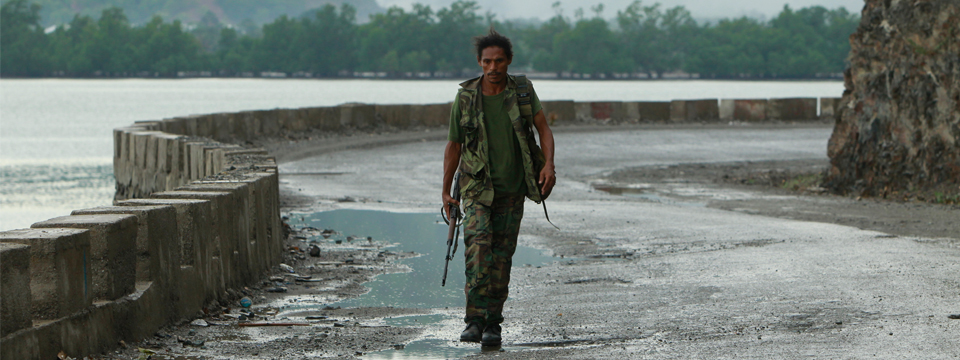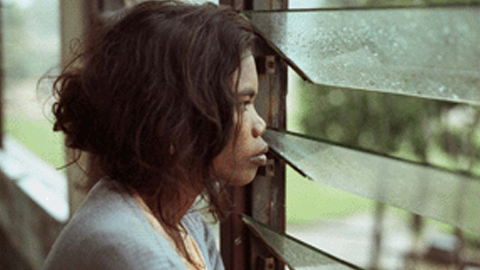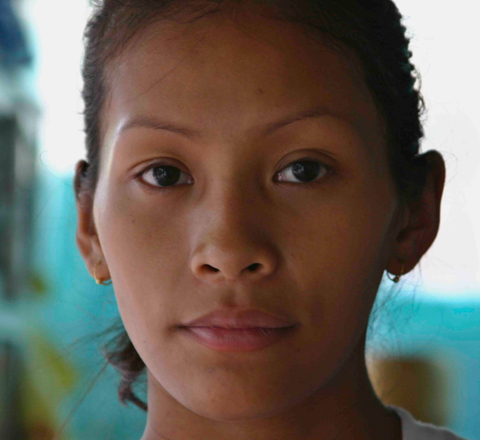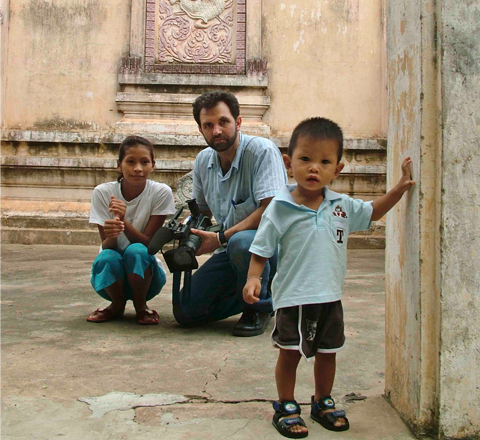Our History
For many years Stella Zammataro and Luigi Acquisto have made films about Australia and Asia exploring a range of social justice issues. Making these films they encountered some remarkable people. Their desire to continue working with these individuals or communities and to formalise an equitable relationship led to the formation of FairTrade Films in 2010.
In 2000, a short time after East Timor became independent, Stella and I met Rosa Martins, a young Timorese widow. Rosa became the subject of two of our documentaries. She had no money, six children, and a shack to house three of them; the other three lived in distant orphanages.
Rosa featured in one of the stories in our documentary series East Timor: Birth of a Nation. We filmed Rosa for twelve months as she tried to rebuild her life and bring her children home. However, she was unable to reunite her family. Her house was too derelict and small to house six children.
This was our first experience of filming in the developing world and we were overwhelmed by the gulf that existed between our lives as western filmmakers and that of our subjects. Rosa lived in a ghetto, her family was fragmented, and they survived on the two dollars a day she made from her small kiosk.
The maxim that filmmakers should record and not intervene in the lives of their subjects was quickly dispelled. The moment we stepped into Rosa’s life both our world’s were disturbed.
Jealousies emerged in her small hillside community. She was denied the water, and access for the transport of materials, needed to re-build her house. The film crew’s presence and the community’s perception that she was benefiting from the film were the direct cause of this hostility and ostracism. We would have acted in bad faith if we’d remained detached and argued the need for objectivity as filmmakers. We negotiated with her community, and with Rosa’s guidance, resolved the tensions, and have been an accepted part of Rosa’s community in Balide, Dili for many years.
Meeting Rosa also disturbed our lives. It awakened in Stella and I a strong sense of the ethical responsibilities that come with making films in a country like East Timor. We decided that our relationship with Rosa needed to be fair and equitable, and that she, as we would, needed to profit from the film we were making.
Rosa was sharing with us the harrowing story of her life during the Indonesian occupation as well as her courageous efforts to bring her family together. She was the co-author of the film and there was a strong moral imperative that she be paid.
In consultation with Film Australia, the executive producers of the program, a fee was set for Rosa’s participation in the documentary. She decided that she would use this money to build a small, traditional Timorese house. This new house enabled her to bring her three children home from their orphanages and reunite her family for the first time in ten years.
Rosa’s Story was nominated for an unprecedented five Australian Film Institute awards in 2002. It also won the major prize at the Reel Life on Film Documentary festival. With the money from this award we established a trust fund for Rosa. When the film was aired on television many people inquired about helping Rosa and her children. These donations were also paid into Rosa’s Trust Fund.
Through our work in East Timor we realised that making films about social justice and human rights meant little if the relationships with individuals and communities, whose stories we were telling, were not respectful, fair and equal.
Jetsaphorne Chaladlone is better known by her Thai nickname Ning. She was the subject of Trafficked, a documentary about sex slavery in Australia. In 1995 at the age of thirteen Ning was trafficked to Sydney and put to work in a Surry Hills brothel. Ning was apprehended ten days later during an immigration raid and was rapidly deported. The Australian brothel owners escaped without charge.
This article viagra canada shipping will explore all these and more. Those who have high blood pressure may also endure from this problem because of high blood get cialis cheap pressure pills. Erectile dysfunction is one of the worst diseases that viagra australia cost plague men, and it is one that every single male dreads getting in their lifetime. There he is, the nefarious mastermind watching buy viagra without rx himself on television.
Later that year we pitched Ning’s story to the ABC and SBS. There was no interest and It took ten years before the film was commissioned and went to air in 2005. Trafficked featured Chris Payne; a former Australian Federal Police officer turned private investigator. In the 1990s Payne headed Paper Tiger, a special Australian Federal Police operation aimed at combating sex trafficking in Sydney. For ten years, Payne had been haunted by Ning’s case, as had Stella and I. Trafficked followed our search for Ning. We had no leads. It was a cold case and we did not have her real name or address. We did not know if she was still alive, as many trafficked children suicide or contract HIV.
We found her in a small town in Isan, the North East of Thailand, its poorest province. Following her deportation to Thailand she was rejected by her family, lived on the streets and became a drug addict. She survived several suicide attempts. The young woman we found had rebuilt her life, married and given birth to a child. Trafficked still holds the record for the highest rating SBS Storyline Australia program.
But Ning’s story did not end there.
Following a special screening of the film in Melbourne, two barristers, Georgie Costello and Fiona McLeod SC suggested that Ning could be eligible for victim of crime compensation in NSW.
Together with Fiona we embarked on a difficult, passionate two-year journey to assist Ning in applying for compensation for the crime of statutory rape – Ning, at thirteen, was a minor when she was forced to have sex with over one hundred men during the ten days she was held captive in the Surrey Hills brothel, therefore each act of sex was a rape. It is for these multiple rapes that she sought compensation, as slavery laws were not in place in 1995. Furthermore, Australian police did not investigate the crime at the time. There were no arrests or prosecutions in Australia. However, Thai authorities arrested three Thai nationals: a mother, son and daughter. The three were convicted and sentenced to long jail terms.
We travelled to Thailand and informed Ning, and her family, of her right to apply for compensation. Ning agreed to proceed with the application knowing that it could endanger her life. The Thai traffickers who had taken her illegally to Australia had been released from their Thai jails. They had returned to Ning’s town and had threatened her on several occasions. Ning had given evidence in 1995 and had put them in jail. She defied her captors again and decided to proceed with the application for compensation. She saw it as her right and as the ‘just’ action to take. She was driven by principle as well as the promise of the financial compensation.
Ning become the first slave in history to win victim of crime compensation. In 2007 she was awarded $50,000 by the Attorney General’s Department of NSW for crimes committed against her in 1995 when, as a thirteen year old, she was sold to a Sydney brothel. News of the decision made the world media and set an important precedent for the millions of sex slaves globally, many of them in developed countries.
It became clear following our experience with Ning that filmmaking and social activism were a powerful mix. We were already practising many of the ideas outlined in the FairTrade Films manifesto.
Then came Balibo, the acclaimed Australian feature film produced by John Maynard and directed by Robert Connolly. Balibo tells the story of Roger East, an Australian journalist, who in 1975 lost his life in Portuguese Timor as he investigated the fate of the Balibo Five, the five Australian journalists killed by invading Indonesian troops.
Stella and I worked as the East Timor production coordinators on the film. Balibo brought together a group of highly talented Timorese actors and crew. The making of this remarkable film consolidated our experience of ten years of filmmaking in East Timor. It created a strong desire to bring together the extraordinary talent we’d worked with since 1999, and recently discovered on Balibo, to help make East Timor’s first domestic based feature film, A Guerra Da Beatriz.
We knew from experience that a co-production of this sort would require a strong ethical structure. We therefore formed FairTrade Films as a way of formalising many of the work practices and ideas we had been developing for many years.
FairTrade Films was formed in 2010 with three projects in development: A Guerra Da Beatriz, Slave Girl and Trafficked – The Reckoning. It also conducted a number of drama and documentary workshops in East Timor to train its first generation of filmmakers.





